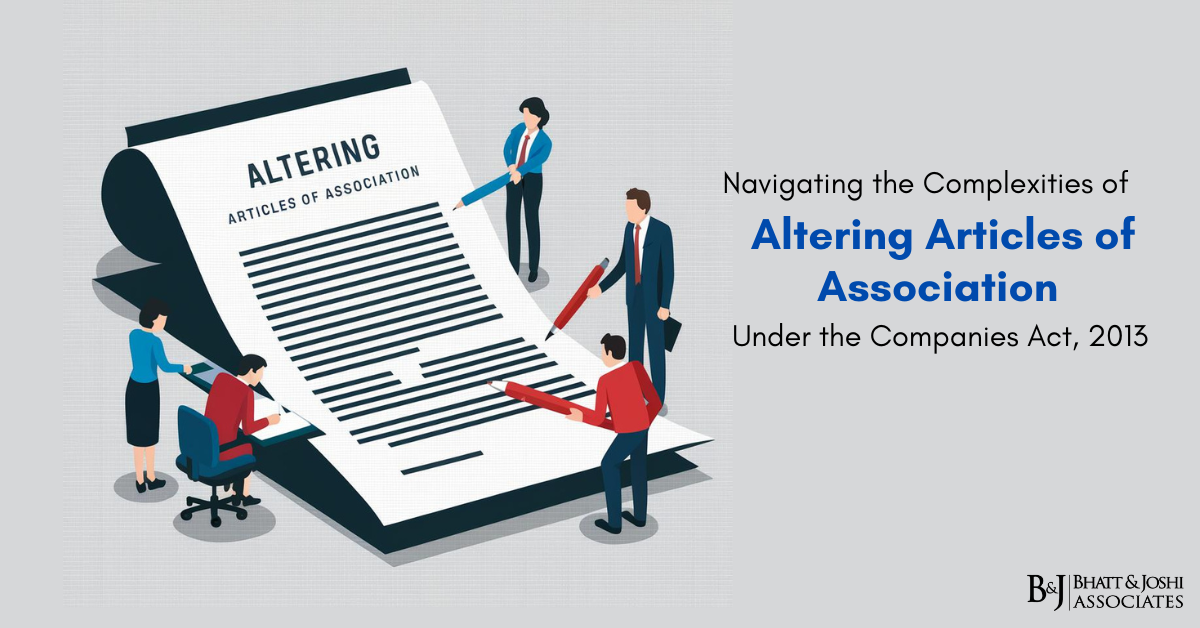Navigating the Complexities of Altering Articles of Association Under the Companies Act, 2013
Introduction: The Cornerstone of Corporate Governance
The Articles of Association (AoA) stand as a fundamental pillar in the structure of any company, delineating its core purposes, operational guidelines, and the duties of its members. In India, the Companies Act, 2013, specifically Section 14 and Rule 33 of the Companies (Incorporation) Rules, 2014, provide the legal framework for modifying these crucial documents. Such alterations can have far-reaching implications, potentially transforming the very nature of a company from private to public or vice versa. This comprehensive analysis delves into the intricacies of altering the Articles of Association in the Indian corporate landscape.
The Legal Foundation: Section 14 of the Companies Act, 2013
At the heart of the process lies Section 14 of the Companies Act, 2013. This pivotal section empowers companies to alter their articles through a special resolution, subject to the Act’s provisions and any conditions stipulated in the company’s memorandum. Notably, these alterations can facilitate the conversion between private and public company status. However, the law introduces a critical caveat: if a private company modifies its articles to remove the restrictions typical of private entities, it automatically transitions to a public company status from the date of alteration.
The Conversion Conundrum: Public to Private and Vice Versa
The Act introduces an asymmetry in the conversion process. While transitioning from a private to a public company requires only internal approvals, the reverse—converting a public company to a private one—demands additional scrutiny. Such a transformation necessitates the approval of the central government, adding a layer of complexity and oversight to the process.
Procedural Precision: Filing Requirements and Deadlines
Post-alteration, companies must adhere to strict filing protocols. Section 14(2) mandates that all alterations, along with any requisite government approvals, be filed with the Registrar within a 15-day window. This filing must include a printed copy of the modified articles, ensuring transparency and official recognition of the changes.
The Mechanics of Conversion: Rule 33 and Form INC-27
Rule 33 of the Companies (Incorporation) Rules, 2014, outlines the specific mechanism for conversion between private and public status. It introduces Form INC-27 as the vehicle for this transformation, requiring companies to file this form along with the prescribed fee. For public to private conversions, an additional step involves obtaining and referencing a Service Request Number (SRN) from the Regional Director’s approval order in the INC-27 filing.
Defining the Private Company: Essential Clauses and Restrictions
To maintain private company status, entities must incorporate specific clauses in their articles. These include restrictions on share transfers, limitations on membership to 200 (with certain exceptions), and prohibitions on public invitations for security subscriptions. The removal of these clauses automatically triggers a transition to public company status, with all the accompanying regulatory implications.
The Special Resolution: A Critical Step in Altering Articles of Association
Altering the AoA requires passing a special resolution, a process that demands the consent of 75% of the members present at the shareholders’ meeting. This high threshold ensures that significant changes to the company’s foundational document receive broad support from its ownership base.
Navigating the Conversion Process: A Guide to Altering Articles of Association
The altering articles of association procedure includes the following steps:
- Board Meeting and Resolution: Initiate the process with a board meeting, providing at least 7 days’ notice to all directors. Pass a resolution approving the proposed alterations and call for an Extraordinary General Meeting (EGM).
- EGM Notice and Conduct: Issue an EGM notice to all shareholders at least 21 days in advance. Conduct the EGM to secure shareholder approval via special resolution.
- Filing Requirements: Submit Form INC-27 for conversions between private and public status. Additionally, file Form MGT-14 within 30 days of the EGM to report the special resolution.
- Government Approval for Public to Private Conversion: If converting from public to private, file Form RD-1 with the Regional Director, attaching the board resolution, special resolution, and public advertisement of the proposed change.
- Final Steps: Upon receiving all necessary approvals, file the altered AoA with the Registrar within the stipulated 15-day period.
Implications and Considerations of Altering Articles of Association
The process of altering the Articles of Association carries significant implications for a company’s governance, regulatory obligations, and operational flexibility. Companies must carefully weigh the benefits and challenges of such alterations, particularly when considering a change in their public or private status. The stringent approval process for converting to a private company underscores the regulatory emphasis on protecting shareholder interests and maintaining market transparency.
Conclusion: Navigating Change with Precision Through Altering Articles of Association
Altering the Articles of Association represents a critical juncture in a company’s evolution. The Companies Act, 2013, provides a robust framework for implementing these changes, balancing the need for corporate flexibility with regulatory oversight. By meticulously adhering to the prescribed procedures and timelines, companies can effectively modify their foundational documents to align with their strategic objectives while maintaining legal compliance. As the corporate landscape continues to evolve, a thorough understanding of these processes becomes increasingly vital for businesses navigating the complexities of corporate governance in India.
 Whatsapp
Whatsapp


